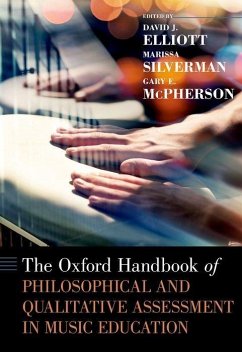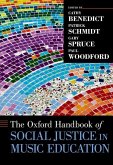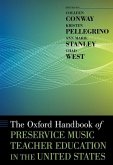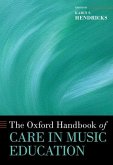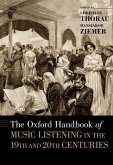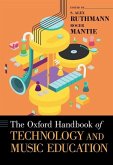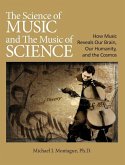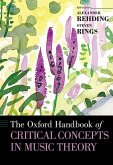The Oxford Handbook of Philosophical and Qualitative Assessment in Music Education
Herausgeber: Elliott, David J; McPherson, Gary E; Silverman, Marissa
The Oxford Handbook of Philosophical and Qualitative Assessment in Music Education
Herausgeber: Elliott, David J; McPherson, Gary E; Silverman, Marissa
- Gebundenes Buch
- Merkliste
- Auf die Merkliste
- Bewerten Bewerten
- Teilen
- Produkt teilen
- Produkterinnerung
- Produkterinnerung
The Oxford Handbook of Philosophical and Qualitative Assessment in Music Education offers critical perspectives on a wide range of conceptual and practical issues in music education assessment and evaluation as these apply to music education in schools and community settings.
Andere Kunden interessierten sich auch für
![Oxford Handbook of Social Justice in Music Education Oxford Handbook of Social Justice in Music Education]() Cathy BenedictOxford Handbook of Social Justice in Music Education229,99 €
Cathy BenedictOxford Handbook of Social Justice in Music Education229,99 €![The Oxford Handbook of Preservice Music Teacher Education in the United States The Oxford Handbook of Preservice Music Teacher Education in the United States]() The Oxford Handbook of Preservice Music Teacher Education in the United States263,99 €
The Oxford Handbook of Preservice Music Teacher Education in the United States263,99 €![The Oxford Handbook of Care in Music Education The Oxford Handbook of Care in Music Education]() The Oxford Handbook of Care in Music Education198,99 €
The Oxford Handbook of Care in Music Education198,99 €![The Oxford Handbook of Music Listening in the 19th and 20th Centuries The Oxford Handbook of Music Listening in the 19th and 20th Centuries]() The Oxford Handbook of Music Listening in the 19th and 20th Centuries233,99 €
The Oxford Handbook of Music Listening in the 19th and 20th Centuries233,99 €![The Oxford Handbook of Technology and Music Education The Oxford Handbook of Technology and Music Education]() The Oxford Handbook of Technology and Music Education233,99 €
The Oxford Handbook of Technology and Music Education233,99 €![The Science of Music and the Music of Science The Science of Music and the Music of Science]() Michael J MontagueThe Science of Music and the Music of Science31,99 €
Michael J MontagueThe Science of Music and the Music of Science31,99 €![Oxford Handbook of Critical Concepts in Music Theory Oxford Handbook of Critical Concepts in Music Theory]() Oxford Handbook of Critical Concepts in Music Theory258,99 €
Oxford Handbook of Critical Concepts in Music Theory258,99 €-
-
-
The Oxford Handbook of Philosophical and Qualitative Assessment in Music Education offers critical perspectives on a wide range of conceptual and practical issues in music education assessment and evaluation as these apply to music education in schools and community settings.
Hinweis: Dieser Artikel kann nur an eine deutsche Lieferadresse ausgeliefert werden.
Hinweis: Dieser Artikel kann nur an eine deutsche Lieferadresse ausgeliefert werden.
Produktdetails
- Produktdetails
- Verlag: Hurst & Co.
- Seitenzahl: 576
- Erscheinungstermin: 30. Juli 2019
- Englisch
- Abmessung: 249mm x 173mm x 41mm
- Gewicht: 1134g
- ISBN-13: 9780190265182
- ISBN-10: 0190265183
- Artikelnr.: 55183562
- Herstellerkennzeichnung
- Produktsicherheitsverantwortliche/r
- Europaallee 1
- 36244 Bad Hersfeld
- gpsr@libri.de
- Verlag: Hurst & Co.
- Seitenzahl: 576
- Erscheinungstermin: 30. Juli 2019
- Englisch
- Abmessung: 249mm x 173mm x 41mm
- Gewicht: 1134g
- ISBN-13: 9780190265182
- ISBN-10: 0190265183
- Artikelnr.: 55183562
- Herstellerkennzeichnung
- Produktsicherheitsverantwortliche/r
- Europaallee 1
- 36244 Bad Hersfeld
- gpsr@libri.de
David J. Elliott is Professor of Music and Music Education at New York University. He is the author of Music Matters: A Philosophy of Music Education, editor of Praxial Music Education: Reflections and Dialogues, founder and editor of the International Journal of Community Music, and an award-winning composer/arranger with works published by Boosey & Hawkes. Marissa Silverman is Associate Professor and Coordinator of Undergraduate Music Education at the John J. Cali School of Music of Montclair State University. A Fulbright Scholar, her research interests include urban music education, music and social justice, interdisciplinary education, community music, and topics in the philosophy of music and music education. Gary E. McPherson is Ormond Professor of Music and Director of the Melbourne Conservatorium of Music at the University of Melbourne. He is a past President of the Australian and International Societies for Music Education and author of over 200 publications, including editing for OUP, The Child as Musician, Musical Prodigies, and co-editing The Oxford Handbook of Music Education.
* I. Foundational Considerations
* 1. Philosophical and qualitative perspectives on assessment in music
education: Introduction, aims, and overview
* David J. Elliott, Marissa Silverman, and Gary E. McPherson
* 2. Institutional music education and ranking as a form of
subjectification: The merits of resistance and resilience
* Lise C. Vaugeois
* 3. An ethical consideration of assessment in music education through
the lens of Levinas Kathryn Jourdan and John Finney
* 4. The primacy of experience: Phenomenology, embodiment, and
assessments in music education
* Andrea Schiavio
* 5. Critically assessing forms of resistance in music education
* Brent C. Talbot and Hakim Mohandas Amani Williams
* 6. Evaluation for equality: Applying a classical pragmatist
perspective in qualitative assessment in Finnish general music
education
* Lauri Väkevä
* 7. Could there be Deleuzian assessment in music education?
* Lauren Kapalka Richerme
* II. Methodological Practices
* 8. Music teacher evaluation, teacher effectiveness, and marginalized
populations:
* A tale of cognitive dissonance and perverse incentives
* Karen Salvador and Janice Krum
* 9. The influence of assessment on learning and teaching: Using
assessment to enhance learning oHowSusan Hallam
* 10. The McDonald's metaphor: The case against assessing
standards-based learning outcomes in music education
* John Kratus
* 11. Habits of mind as a framework for assessment in music education
* Jillian Hogan and Ellen Winner
* 12. Alternative assessment for music students with significant
disabilities: Collaboration, inclusion, and transformation
* Donald DeVito, Megan M. Sheridan, Jian-Jun Chen-Edmund, David Edmund,
and Steven Bingham
* 13. A music-centered perspective on music therapy assessment
* John Carpente and Kenneth Aigen
* 14. A case for integrative assessment from a Freirian perspective
* Frank Abrahams
* III. Creativity
* 15. Cultural imperialism and the assessment of creative work
* Juniper Hill
* 16. Enter the feedback loop: Assessing music technology in music
education with personal bests Adam Patrick Bell
* 17. Improvisation, enaction, and self-assessment
* Dylan van der Schyff
* 18. Philosophy of assessment in popular music education
* Bryan Powell and Gareth Dylan Smith
* 19. "He sings with rhythm; he is from India": Children's drawings and
the music classroom Roger Mantie and Beatriz Ilari
* IV. International Perspectives
* 20. The assessment of classroom music in the lower secondary school:
The English experience Martin Fautley
* 21. Imagining beyond ends-in-view: The ethics of assessment as
valuation in Nepali music education
* Danielle Shannon Treacy, Vilma Timonen, Alexis Anja Kallio, and Iman
Shah
* 22. Assessment as care: A South African perspective
* Janelize van der Merwe
* 23. Assessment and the dilemmas of a multi-ideological curriculum:
The case of Norway
* Sidsel Karlsen and Geir Johansen
* 24. Building a culture of ethical, comparable, authentic assessment:
Music education in Queensland
* Andrew Reid and Julie Ballantyne
* 25. Music as bildning: The impracticability of assessment within the
Scandinavian educational tradition
* Johan Söderman
* 26. Non-regulated assessment in music education: An urban Iranian
outlook
* Nasim Niknafs
* 27. International perspectives on assessment in music education
* Alexandra Kertz-Welzel
* Notes
* Author Index
* Subject Index
* 1. Philosophical and qualitative perspectives on assessment in music
education: Introduction, aims, and overview
* David J. Elliott, Marissa Silverman, and Gary E. McPherson
* 2. Institutional music education and ranking as a form of
subjectification: The merits of resistance and resilience
* Lise C. Vaugeois
* 3. An ethical consideration of assessment in music education through
the lens of Levinas Kathryn Jourdan and John Finney
* 4. The primacy of experience: Phenomenology, embodiment, and
assessments in music education
* Andrea Schiavio
* 5. Critically assessing forms of resistance in music education
* Brent C. Talbot and Hakim Mohandas Amani Williams
* 6. Evaluation for equality: Applying a classical pragmatist
perspective in qualitative assessment in Finnish general music
education
* Lauri Väkevä
* 7. Could there be Deleuzian assessment in music education?
* Lauren Kapalka Richerme
* II. Methodological Practices
* 8. Music teacher evaluation, teacher effectiveness, and marginalized
populations:
* A tale of cognitive dissonance and perverse incentives
* Karen Salvador and Janice Krum
* 9. The influence of assessment on learning and teaching: Using
assessment to enhance learning oHowSusan Hallam
* 10. The McDonald's metaphor: The case against assessing
standards-based learning outcomes in music education
* John Kratus
* 11. Habits of mind as a framework for assessment in music education
* Jillian Hogan and Ellen Winner
* 12. Alternative assessment for music students with significant
disabilities: Collaboration, inclusion, and transformation
* Donald DeVito, Megan M. Sheridan, Jian-Jun Chen-Edmund, David Edmund,
and Steven Bingham
* 13. A music-centered perspective on music therapy assessment
* John Carpente and Kenneth Aigen
* 14. A case for integrative assessment from a Freirian perspective
* Frank Abrahams
* III. Creativity
* 15. Cultural imperialism and the assessment of creative work
* Juniper Hill
* 16. Enter the feedback loop: Assessing music technology in music
education with personal bests Adam Patrick Bell
* 17. Improvisation, enaction, and self-assessment
* Dylan van der Schyff
* 18. Philosophy of assessment in popular music education
* Bryan Powell and Gareth Dylan Smith
* 19. "He sings with rhythm; he is from India": Children's drawings and
the music classroom Roger Mantie and Beatriz Ilari
* IV. International Perspectives
* 20. The assessment of classroom music in the lower secondary school:
The English experience Martin Fautley
* 21. Imagining beyond ends-in-view: The ethics of assessment as
valuation in Nepali music education
* Danielle Shannon Treacy, Vilma Timonen, Alexis Anja Kallio, and Iman
Shah
* 22. Assessment as care: A South African perspective
* Janelize van der Merwe
* 23. Assessment and the dilemmas of a multi-ideological curriculum:
The case of Norway
* Sidsel Karlsen and Geir Johansen
* 24. Building a culture of ethical, comparable, authentic assessment:
Music education in Queensland
* Andrew Reid and Julie Ballantyne
* 25. Music as bildning: The impracticability of assessment within the
Scandinavian educational tradition
* Johan Söderman
* 26. Non-regulated assessment in music education: An urban Iranian
outlook
* Nasim Niknafs
* 27. International perspectives on assessment in music education
* Alexandra Kertz-Welzel
* Notes
* Author Index
* Subject Index
* I. Foundational Considerations
* 1. Philosophical and qualitative perspectives on assessment in music
education: Introduction, aims, and overview
* David J. Elliott, Marissa Silverman, and Gary E. McPherson
* 2. Institutional music education and ranking as a form of
subjectification: The merits of resistance and resilience
* Lise C. Vaugeois
* 3. An ethical consideration of assessment in music education through
the lens of Levinas Kathryn Jourdan and John Finney
* 4. The primacy of experience: Phenomenology, embodiment, and
assessments in music education
* Andrea Schiavio
* 5. Critically assessing forms of resistance in music education
* Brent C. Talbot and Hakim Mohandas Amani Williams
* 6. Evaluation for equality: Applying a classical pragmatist
perspective in qualitative assessment in Finnish general music
education
* Lauri Väkevä
* 7. Could there be Deleuzian assessment in music education?
* Lauren Kapalka Richerme
* II. Methodological Practices
* 8. Music teacher evaluation, teacher effectiveness, and marginalized
populations:
* A tale of cognitive dissonance and perverse incentives
* Karen Salvador and Janice Krum
* 9. The influence of assessment on learning and teaching: Using
assessment to enhance learning oHowSusan Hallam
* 10. The McDonald's metaphor: The case against assessing
standards-based learning outcomes in music education
* John Kratus
* 11. Habits of mind as a framework for assessment in music education
* Jillian Hogan and Ellen Winner
* 12. Alternative assessment for music students with significant
disabilities: Collaboration, inclusion, and transformation
* Donald DeVito, Megan M. Sheridan, Jian-Jun Chen-Edmund, David Edmund,
and Steven Bingham
* 13. A music-centered perspective on music therapy assessment
* John Carpente and Kenneth Aigen
* 14. A case for integrative assessment from a Freirian perspective
* Frank Abrahams
* III. Creativity
* 15. Cultural imperialism and the assessment of creative work
* Juniper Hill
* 16. Enter the feedback loop: Assessing music technology in music
education with personal bests Adam Patrick Bell
* 17. Improvisation, enaction, and self-assessment
* Dylan van der Schyff
* 18. Philosophy of assessment in popular music education
* Bryan Powell and Gareth Dylan Smith
* 19. "He sings with rhythm; he is from India": Children's drawings and
the music classroom Roger Mantie and Beatriz Ilari
* IV. International Perspectives
* 20. The assessment of classroom music in the lower secondary school:
The English experience Martin Fautley
* 21. Imagining beyond ends-in-view: The ethics of assessment as
valuation in Nepali music education
* Danielle Shannon Treacy, Vilma Timonen, Alexis Anja Kallio, and Iman
Shah
* 22. Assessment as care: A South African perspective
* Janelize van der Merwe
* 23. Assessment and the dilemmas of a multi-ideological curriculum:
The case of Norway
* Sidsel Karlsen and Geir Johansen
* 24. Building a culture of ethical, comparable, authentic assessment:
Music education in Queensland
* Andrew Reid and Julie Ballantyne
* 25. Music as bildning: The impracticability of assessment within the
Scandinavian educational tradition
* Johan Söderman
* 26. Non-regulated assessment in music education: An urban Iranian
outlook
* Nasim Niknafs
* 27. International perspectives on assessment in music education
* Alexandra Kertz-Welzel
* Notes
* Author Index
* Subject Index
* 1. Philosophical and qualitative perspectives on assessment in music
education: Introduction, aims, and overview
* David J. Elliott, Marissa Silverman, and Gary E. McPherson
* 2. Institutional music education and ranking as a form of
subjectification: The merits of resistance and resilience
* Lise C. Vaugeois
* 3. An ethical consideration of assessment in music education through
the lens of Levinas Kathryn Jourdan and John Finney
* 4. The primacy of experience: Phenomenology, embodiment, and
assessments in music education
* Andrea Schiavio
* 5. Critically assessing forms of resistance in music education
* Brent C. Talbot and Hakim Mohandas Amani Williams
* 6. Evaluation for equality: Applying a classical pragmatist
perspective in qualitative assessment in Finnish general music
education
* Lauri Väkevä
* 7. Could there be Deleuzian assessment in music education?
* Lauren Kapalka Richerme
* II. Methodological Practices
* 8. Music teacher evaluation, teacher effectiveness, and marginalized
populations:
* A tale of cognitive dissonance and perverse incentives
* Karen Salvador and Janice Krum
* 9. The influence of assessment on learning and teaching: Using
assessment to enhance learning oHowSusan Hallam
* 10. The McDonald's metaphor: The case against assessing
standards-based learning outcomes in music education
* John Kratus
* 11. Habits of mind as a framework for assessment in music education
* Jillian Hogan and Ellen Winner
* 12. Alternative assessment for music students with significant
disabilities: Collaboration, inclusion, and transformation
* Donald DeVito, Megan M. Sheridan, Jian-Jun Chen-Edmund, David Edmund,
and Steven Bingham
* 13. A music-centered perspective on music therapy assessment
* John Carpente and Kenneth Aigen
* 14. A case for integrative assessment from a Freirian perspective
* Frank Abrahams
* III. Creativity
* 15. Cultural imperialism and the assessment of creative work
* Juniper Hill
* 16. Enter the feedback loop: Assessing music technology in music
education with personal bests Adam Patrick Bell
* 17. Improvisation, enaction, and self-assessment
* Dylan van der Schyff
* 18. Philosophy of assessment in popular music education
* Bryan Powell and Gareth Dylan Smith
* 19. "He sings with rhythm; he is from India": Children's drawings and
the music classroom Roger Mantie and Beatriz Ilari
* IV. International Perspectives
* 20. The assessment of classroom music in the lower secondary school:
The English experience Martin Fautley
* 21. Imagining beyond ends-in-view: The ethics of assessment as
valuation in Nepali music education
* Danielle Shannon Treacy, Vilma Timonen, Alexis Anja Kallio, and Iman
Shah
* 22. Assessment as care: A South African perspective
* Janelize van der Merwe
* 23. Assessment and the dilemmas of a multi-ideological curriculum:
The case of Norway
* Sidsel Karlsen and Geir Johansen
* 24. Building a culture of ethical, comparable, authentic assessment:
Music education in Queensland
* Andrew Reid and Julie Ballantyne
* 25. Music as bildning: The impracticability of assessment within the
Scandinavian educational tradition
* Johan Söderman
* 26. Non-regulated assessment in music education: An urban Iranian
outlook
* Nasim Niknafs
* 27. International perspectives on assessment in music education
* Alexandra Kertz-Welzel
* Notes
* Author Index
* Subject Index

